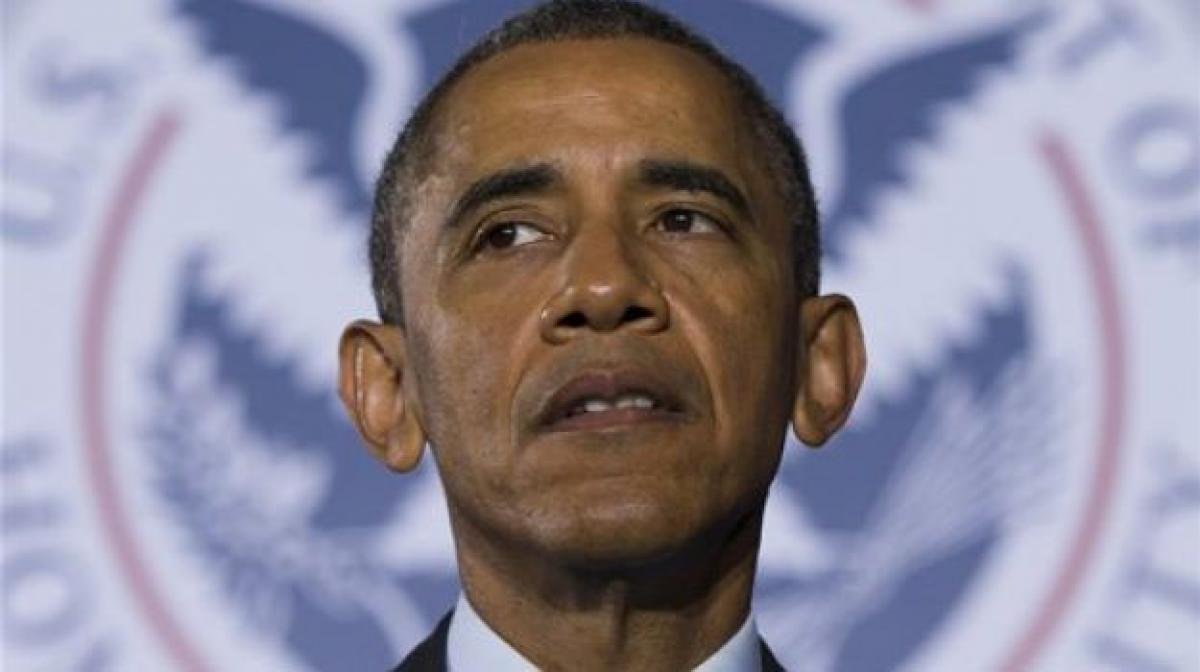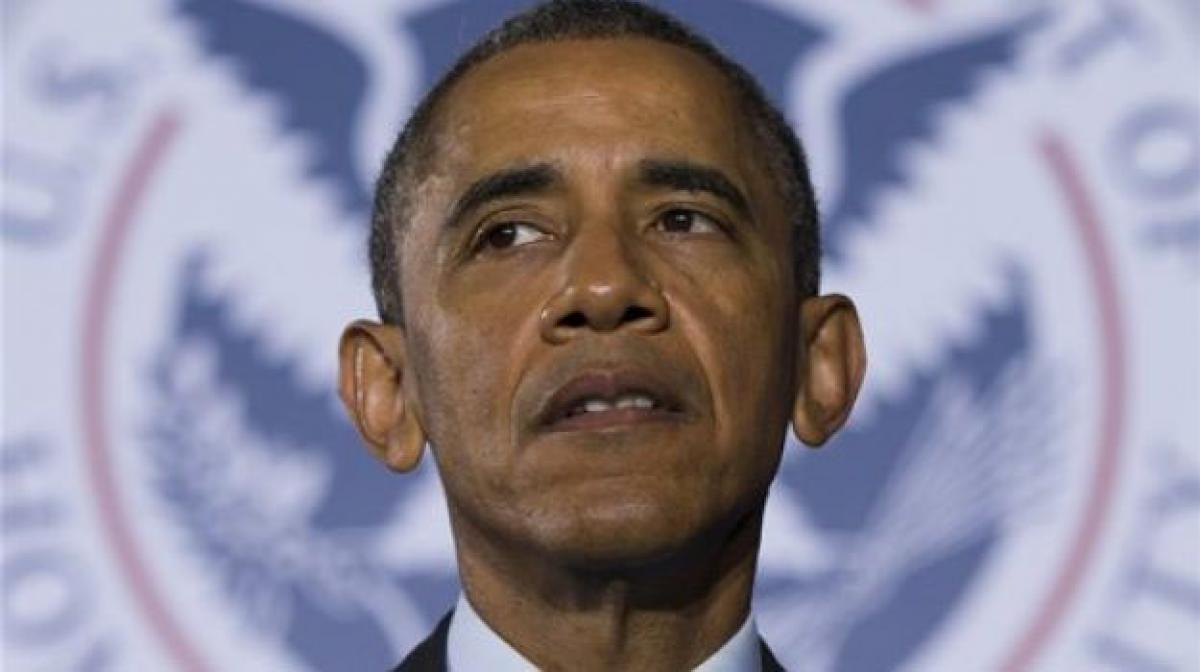Live
- GMR Airports Unveils AI-Powered Digital Twin Platform to Transform Airport Operations
- India poised to become leading maritime player: PM Modi
- Top Causes of Kidney Stones and How to Recognize Silent Symptoms
- India’s renewable energy capacity logs 14.2 pc growth at 213.7 GW
- Winter Session of Odisha Assembly adjourned sine die
- Biden calls Trump's tariff approach 'major mistake'
- After Drama Over Eknath Shinde’s Chief Minister Race, Maharashtra Cabinet Formation Faces New Tensions
- Egyptian FM, Blinken discuss recent developments in Syria
- Iran's supreme leader says Syria's developments result of US-Israeli 'plot'
- Elon Musk to Purchase $100 Million Luxury Mansion Next to Donald Trump's Mar-a-Lago, Report Reveals
Just In

x
Highlights
US President Barack Obama granted clemency Monday to 46 convicted drug traffickers, saying their original sentences were unduly harsh under outdated laws.
US President Barack Obama granted clemency Monday to 46 convicted drug traffickers, saying their original sentences were unduly harsh under outdated laws.

The move brings the total number of commutations Obama has issued to 89, reducing the sentences of more convicts than the last four presidents combined.
"These men and women were not hardened criminals," Obama said in a video released on the White House Facebook page.
"But the overwhelming majority had been sentenced to at least 20 years; 14 of them had been sentenced to life for nonviolent drug offenses, so their punishments didn't fit the crime."
The US prison population dwarfs that of other countries, making the United States the world's biggest jailer.
Obama has issued commutations before as part of his administration's efforts to reform the criminal justice system. He has granted clemency mostly to non-violent drug offenders, but never in such a large number.
The president noted that if these convicts had been sentenced under current laws, nearly all of them would have already served their time by now.
"I believe these folks deserve their second chance," he said.
White House spokesman Josh Earnest said Obama has taken "pretty bold action" as concerns commutations.
On Tuesday, Obama is scheduled to deliver a speech before the nation's biggest civil rights group, the National Association for the Advancement of Colored People, outlining proposals for justice reform.
The White House said he would highlight "unfairness in much of our criminal justice system," as well as "lay out his own ideas to make our justice system fairer, smarter, and more cost-effective while keeping the American people safe and secure."
Thousands of people have applied for commutations, but only a handful of the requests were approved.
In a signed letter addressed to each of the inmates, Obama wrote that they were chosen to receive clemency because "you have demonstrated the potential to turn your life around."
"I believe in your ability to prove the doubters wrong, and change your life for the better," he added. "So good luck, and Godspeed."
On Thursday, Obama will make the first visit by a sitting president to a federal prison, El Reno Federal Correctional Institution outside of Oklahoma City.
US Senator Dick Durbin hailed the commutations as an "important step."
"In far too many cases in our justice system, the punishments don't fit the crimes," he said in a statement.
"This has led to an explosion of the US prison population and is oftentimes unfair, fiscally irresponsible and even a threat to public safety."
One in 99 adults lives in jail in the US and the prison population has jumped 700 percent since 1970, according to the American Civil Liberties Union, a leading rights group.
Counting prison, jail, parole and probation populations, one adult in 31 is under some form of correctional control in the United States.
US President Barack Obama granted clemency Monday to 46 convicted drug traffickers, saying their original sentences were unduly harsh under outdated laws.
The move brings the total number of commutations Obama has issued to 89, reducing the sentences of more convicts than the last four presidents combined.
"These men and women were not hardened criminals," Obama said in a video released on the White House Facebook page.
"But the overwhelming majority had been sentenced to at least 20 years; 14 of them had been sentenced to life for nonviolent drug offenses, so their punishments didn't fit the crime."
The US prison population dwarfs that of other countries, making the United States the world's biggest jailer.
Obama has issued commutations before as part of his administration's efforts to reform the criminal justice system. He has granted clemency mostly to non-violent drug offenders, but never in such a large number.
The president noted that if these convicts had been sentenced under current laws, nearly all of them would have already served their time by now.
"I believe these folks deserve their second chance," he said.
White House spokesman Josh Earnest said Obama has taken "pretty bold action" as concerns commutations.
On Tuesday, Obama is scheduled to deliver a speech before the nation's biggest civil rights group, the National Association for the Advancement of Colored People, outlining proposals for justice reform.
The White House said he would highlight "unfairness in much of our criminal justice system," as well as "lay out his own ideas to make our justice system fairer, smarter, and more cost-effective while keeping the American people safe and secure."
Thousands of people have applied for commutations, but only a handful of the requests were approved.
In a signed letter addressed to each of the inmates, Obama wrote that they were chosen to receive clemency because "you have demonstrated the potential to turn your life around."
"I believe in your ability to prove the doubters wrong, and change your life for the better," he added. "So good luck, and Godspeed."
On Thursday, Obama will make the first visit by a sitting president to a federal prison, El Reno Federal Correctional Institution outside of Oklahoma City.
US Senator Dick Durbin hailed the commutations as an "important step."
"In far too many cases in our justice system, the punishments don't fit the crimes," he said in a statement.
"This has led to an explosion of the US prison population and is oftentimes unfair, fiscally irresponsible and even a threat to public safety."
One in 99 adults lives in jail in the US and the prison population has jumped 700 percent since 1970, according to the American Civil Liberties Union, a leading rights group.
Counting prison, jail, parole and probation populations, one adult in 31 is under some form of correctional control in the United States.

Next Story
More Stories
ADVERTISEMENT
© 2024 Hyderabad Media House Limited/The Hans India. All rights reserved. Powered by hocalwire.com







